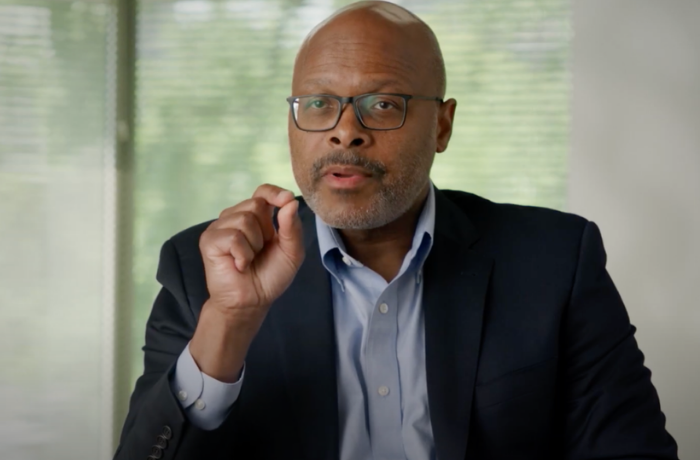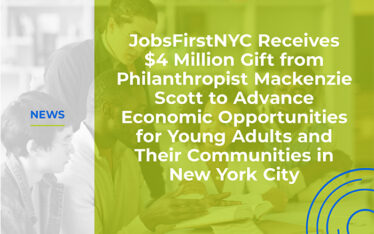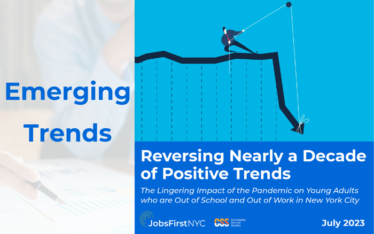Black History Month celebrations have long outgrown the confines of February, the shortest month of the year. Black excellence and advancements happen each day and should be regularly acknowledged. One of the most ambitious plans to elevate the Black community is OneTen, a corporate-led national coalition initiated in 2020. What distinguishes OneTen from similar visions of economic justice is the long-term, multi-partner investment outlined by its’ founders to formulate sustainable skills-building and employment pathways for Black Americans. In February, JobsFirstNYC sat down for a conversation with Maurice Jones, CEO of OneTen.
JobsFirstNYC has partnered with OneTen, a coalition of leading executives who have committed to upskill, hire and promote one million Black individuals in America into family-sustaining jobs with opportunities for advancement by 2030. Building on JobsFirstNYC’s comprehensive, system-level view of the City’s workforce ecosystem, together we are creating a more equitable, inclusive economy and generating better business outcomes for employers
JobsFirstNYC: Maurice, how would you explain to your friend’s 7-year-old child what you do for a living?.
Maurice: OneTen helps Black people who have not graduated from a four-year college to find jobs that will allow them to take care of their families’ needs, save for the future, buy homes, and send their children to college. We work with companies to make sure they are able to hire and promote Black employees based on their skills and talents. We also partner with training programs to make sure those adults learn the important skills they need to do their jobs well; and we connect with community organizations who can ensure that the adults we work with have all the things they need – like childcare, mental health support, and transportation – to be successful in their jobs. We all work together for our biggest goal: to help one million Black people without degrees find well-paying, exciting careers in the next ten years.
JobsFirstNYC: One of the barriers-reducing practices OneTen encourages employers to take in support of your mission is a skills-first approach to job descriptions and hiring. Can you describe what this is and how it is working?
Maurice: The current approach to hiring often prioritizes credentials. This means that many job descriptions require applicants to have four-year degrees, regardless of whether that credential is relevant to the duties of the role. What that means is that Black talent – 76% of whom don’t have a four-year degree – become ineligible for more than 4 million jobs they could effectively fill.
The skills-first approach prioritizes competencies and experience. With this approach, employers focus on identifying the skills and competencies jobs require and hire and promote according to those factors.
So far, the impact has been incredible. At OneTen, we’ve seen approximately 25,000 people hired and promoted at companies across our coalition using the skills-based approach. And the benefit goes both ways – Black talent gets access to family-sustaining jobs and all the opportunities they bring; employers get a larger and more diverse talent pool and higher employee retention rates. The future of work is skills-first.
JobsFirstNYC: Why is it important for OneTen to forge partnerships with intermediaries like JobsFirstNYC?
Maurice: OneTen’s mission isn’t about just placing Black talent in great jobs that pay a family-sustaining wage. We are committed to ensuring that Black talent has the resources they need to be successful in their careers, and even in their lives. This means that in addition to working with companies to change their practices and mindsets, we also focus on providing the Black talent we serve with resources and supports they need to thrive. That’s why partnerships with organizations like JobsFirstNYC are so important. As OneTen’s Community Development Lead, JobsFirstNYC plays an active leadership and project management role for the New York metropolitan area, acting as liaison to workforce development and education systems, coordinating support services for talent development organizations, and building a community of practice. These partnerships ensure that Black talent can get skills training and professional development, build their career confidence, and access services and supports like childcare and transportation.
Ultimately, we understand that driving systemic change is a team sport. None of us can solve the problem of underemployment and unemployment alone. Partnerships allow us to make sure that all the barriers that have historically kept Black talent from climbing the corporate ladder are toppled and new pathways to success are forged.
JobsFirstNYC: Tell us about OneTen’s success in keeping executives accountable in changing hiring practices and processes.
Maurice: Because we understand the importance of our mission, we’ve built accountability into the core of our organization, our work, and our partnerships. To join the Coalition, for example, requires a commitment from the top of the organization, the CEO. Every organization we work with is expected to announce their partnership with us, both publicly via the media and internally via company communications. These announcements create accountability between the company and their stakeholders who will be watching to see how these companies maintain their commitments.
Our “Community of Practice” is another key system of accountability we use. Through the Community of Practice, we create and host working sessions that guide our partnering organizations towards more inclusive workplaces and meaningful supports for Black talent. These sessions are attended by CEOs, CHROs, DEI leads, and other executives who openly share the challenges they’re working through and the progress they’ve made. It’s an opportunity for these organizations and leaders to be held accountable by us and their peers.
We’re also big on data, ensuring our partnering organizations capture and measure key metrics needed to track progress and change. It’s not enough to say they’re going to hire, promote, and advance Black talent. There needs to be proof that work is being done, and data is the easiest way to demonstrate that. And we lead by example. We hold ourselves accountable through data as well, providing regular external reports on our coalition’s progress.
JobsFirstNYC: In addition to hundreds of thousands more Black Americans in good jobs, in five years what impacts will OneTen evaluate itself against?
Maurice: In five years, we’ll be at the halfway point of OneTen’s mission and have placed hundreds of thousands of Black talent in family-sustaining jobs. But the true measure of success for us will be the longevity of these placements and the job satisfaction of this community of talent. It’s not enough for us to place Black talent in well-paying jobs. We want to see that those hires remain with those companies, with promotions and raises, because advancement is just as important to us as getting them in the door.
We’ll also consider our mission on track if, in five years, we start to see more widespread shifts in the employment landscape towards more skills-based, equitable and inclusive hiring. So far, we’ve had dozens of notable, sought-after companies join our coalition. These are leaders in their industries and they’re already well on their way towards historic change. I’m optimistic, as these companies deepen their commitment to the OneTen Mission, that more of their industry peers will follow suit.





